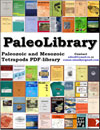
Complete Data Base of Paleozoic and Mesozoic Tetrapods.
Paleo-News and illustrations. Big electronic PDF-library.
| |
| PaleoNews |
| Classification |
| Books and Articles |
| Contact |
| Forum |
сайт о динозаврах
рейтинг сайтов
Free Counter
myspace hit counter
Marine reptile fossils 100 million years old found in outback Queensland |
July 22 , 2016 by Zara Margolis and Harriet Tatham Scientists and international volunteers have unearthed 100-million-year-old fossilised marine reptile bones during an annual dig in north-west Queensland. The dig, led by local palaeontologists from Richmond's Kronosaurus Korner museum, spent last week digging for fossils on cattle stations between Richmond and Julia Creek. Curator Dr Patrick Smith said the most exciting discovery was finding the about 60 per cent intact ichthyosaur. "We got out an ichthyosaur [with] complete paddle bones, parts of the lower jaw and even a complete tail," he said. Dr Smith said a fully intact ichthyosaurus was a rare discovery. "It's almost never found out here. You'll find bits and pieces of the animal — isolated paddle bones or vertebrae — but you won't find a complete animal," he said. Sharing lessons with the publicAccording to Dr Smith, an ichthyosaur is a marine reptile that previously lived in Australia's inland sea. "They look a bit like a dolphin, have a dorsal fin above their back, and a long snout out the front, except their tail — rather than being pointed either side of the body it's pointed up down — so it's a bit like the tail of a shark or a fish," he said. "It's related to a lot of the reptiles that we have today, however there's no modern animal that's like an ichthyosaur."Dr Smith said he hoped the discovery, which will eventually be displayed in Kronosaurus Korner, will help to educate the general public. "Whereas previously we'd had a few specimens come out of the ground which didn't really show the full anatomy, this specimen will show greatly to the public the anatomy of this animal," he said. Hope remains for kronosaurusWhile the dig was a success, Dr Smith said his team did encounter some difficulties. On day one the group headed to Euraba Station, where local grazier Robert Hacon found a kronosaurus jaw in 2015. "We went out to that property and we started digging three holes to find the rest of the kronosaurus, and found absolutely nothing," he said. "It's likely that it's probably been washed away or eroded over time but that doesn't mean that we give up hope on that specimen. "We will have a look out for that specimen in the future but for the moment, I think we won't be digging where we were before." http://www.abc.net.au/news/2016-07-12/marine-fossils-found-in-outback-qld/7589792
|
